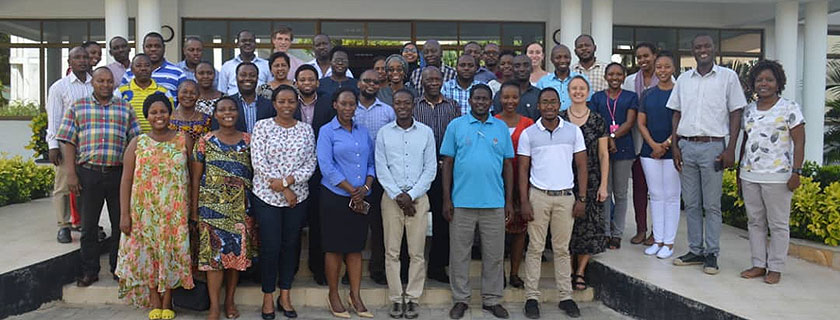
Global health teams from Dartmouth’s Geisel School of Medicine and its partner organizations took another important step in their longstanding efforts to combat HIV and tuberculosis (TB) in East Africa when they held a TB symposium in Dar es Salaam, Tanzania in December.
The symposium was a joint effort by Geisel’s DarDar programs and Muhimbili University of Health and Allied Sciences (MUHAS), and the National TB and Leprosy Programme and National AIDS Control Program—two branches of the Ministry of Health in Tanzania.
“The program addressed both the progress with TB care and prevention in Tanzania and the many challenges that lie ahead,” says Lisa V. Adams, MED ’90, director of the Center for Health Equity and associate dean for global health at Geisel, who served as a speaker and co-moderator for the symposium. “We had about 50 participants representing all of the partners—including Dr. Beatrice Mutayoba, head of the TB program at the Tanzanian Ministry of Health, as well as faculty at MUHAS, and members of the study teams in our research projects.”
“The symposium was of significant advantage to the attendees, as it brought in opportunities to receive updates on national TB treatment, diagnostics, and prevention. It was also an eye-opener on global efforts in TB vaccine developments,” says Dr. Jamila Didi, study coordinator for a controlled trial of DAR-901—Dartmouth’s promising new TB booster vaccine. The study is entering its third and final year among 650 adolescents in Dar es Salaam.
The symposium was the first major initiative since Geisel, together with Boston University School of Public Health, was awarded their fourth 5-year renewal of an HIV training grant from the Fogarty International Center at the National Institutes of Health. The $1.5 million grant is supporting HIV and TB research and training activities, as part of MUHAS’ newly established Infectious Disease Institute in Dar es Salaam, and continues the successful 17-year history of collaborative DarDar programs.
The symposium helped to prepare candidates who will be selected to complete masters or PhD degree programs at Dartmouth or Boston University, Adams says, noting that Geisel and MUHAS continue to run a robust medical student exchange program.
“It was also an opportunity to refresh old professional relationships and create new networks,” says Didi. “A greater impact will be realized if similar events are conducted annually. We are pleased and grateful for the experience.”
Overall, one of the most important goals of the teams is to help build linkages between public health and academia, explains Adams, who provided a summary of the latest Fogarty grant and planned training activities at the symposium. “For example, the national TB and AIDS control programs have collected extensive data on the two diseases, but don’t have the staff time or capacity to fully analyze the information,” she says. “The candidates who we support for degree programs can analyze this data as part of their masters and PhD programs. The result will be a win-win for everyone, helping to affect change and to inform program direction and public health activities.”
Tuberculosis is now the leading infectious disease cause of death in the world and roughly one-third of TB patients in Tanzania have underlying HIV infection, according to Adams. The training and collaborations sponsored by the Fogarty grant are vital to making further inroads against HIV-related TB.
Despite the progress made in the diagnosis and treatment of the disease in recent years, the emergence of drug-resistant TB has made it more difficult and expensive to treat. TB remains the leading cause of death among people living with HIV in Tanzania.
“TB now causes more deaths than HIV globally,” says Adams. “I’m so in awe of all the successes that the HIV community has achieved and the resources that have supported such progress, and it’s time now to replicate that in the TB community.”